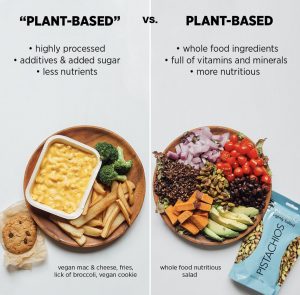Everything About Healthy Food: Benefits of Taking On Plant Based Options
The discussion surrounding plant-based diets has gained significant focus recently. Many individuals are checking out the prospective health and wellness advantages, dietary benefits, and ecological effects related to these dietary choices. As individuals come to be a lot more conscious of their food's influence on well-being and sustainability, questions emerge concerning the functionalities of embracing such a lifestyle. What specific adjustments can one anticipate, and how might these choices reshape not only individual health and wellness but also the earth's future?
Comprehending Plant-Based Diets
Although lots of people connect plant-based diets mostly with vegetarianism or veganism, these diet plans can encompass a large range of eating patterns that focus on whole, minimally refined plant foods. Such diet plans frequently consist of fruits, vegetables, entire grains, legumes, nuts, and seeds, while limiting or getting rid of pet items. This adaptability enables individuals to customize their nutritional choices according to nutritional requirements and individual preferences. Some may take on a primarily plant-based diet plan while still periodically consuming meat or dairy products, usually referred to as a flexitarian technique. The emphasis remains on integrating even more plant foods, which can lead to a varied selection of dishes and flavors. Recognizing these various interpretations of plant-based consuming is essential for appreciating its availability and allure in contemporary food culture.
Health And Wellness Perks of Plant-Based Foods
The wellness advantages of plant-based foods are significant, providing a nutrient thickness advantage that supports general wellness. Research study shows that these foods can boost heart health and play a vital function in efficient weight monitoring. By including extra plant-based alternatives, people might boost their nutritional selections and advertise lasting wellness.
Nutrient Thickness Benefit
Nutrient thickness plays a crucial role in the wellness advantages of plant-based foods, making them a compelling option for those seeking a balanced diet. Plant-based foods, such as fruits, veggies, legumes, nuts, and whole grains, are typically rich in necessary vitamins, minerals, and anti-oxidants while being lower in calories. This high nutrient density allows individuals to eat less calories while still fulfilling their dietary requirements. Furthermore, these foods are packed with nutritional fiber, advertising digestion health and wellness and helping in weight management. By including nutrient-dense plant-based alternatives, customers can enhance their overall wellness, sustain their immune systems, and reduce the threat of persistent diseases. Ultimately, the nutrient thickness of plant-based foods highlights their importance in a health-conscious way of living.
Heart Health And Wellness Enhancement

Weight Administration Support
Along with promoting heart health, a plant-based diet plan can significantly aid in weight monitoring. This nutritional method stresses whole foods such as fruits, veggies, vegetables, nuts, and entire grains, which are normally reduced in calories and higher in fiber contrasted to animal-based items. The high fiber material helps boost satiety, lowering overall calorie consumption. Plant-based diet plans are usually rich in crucial nutrients while low in undesirable fats, making it easier to preserve a healthy and balanced weight. Research suggests that people that adopt a plant-based way of life tend to have lower body mass indexes (BMIs) and experience even more effective weight-loss contrasted to those that consume meat-heavy diet plans. Accepting plant-based alternatives is a strategic choice for efficient weight administration.
Nutritional Value of Plant-Based Ingredients
Plant-based active ingredients are rich in vital nutrients, supplying a varied array of vitamins, minerals, and antioxidants that contribute to general health and wellness. A contrast of healthy protein resources discloses that while pet products are typically considered as premium, several plant-based options provide adequate protein and other advantageous compounds. Understanding the nutritional value of these ingredients can help individuals make informed nutritional selections.
Crucial Nutrients in Plants
Nutrient-rich ingredients located in plants supply a varied variety of necessary nutrients that add considerably to general health. These ingredients are abundant in vitamins A, C, and K, which sustain immune function, vision, and blood clotting, respectively. Furthermore, plants supply essential minerals such as magnesium, potassium, and calcium, important for heart their website health, muscular tissue feature, and bone stamina. The presence of fiber in plant-based foods help digestion and advertises a healthy and balanced digestive tract microbiome. Anti-oxidants, located generously in fruits and vegetables, assistance fight oxidative anxiety and decrease swelling. Additionally, numerous plant foods are reduced in calories yet high in nutrients, making them an outstanding selection for those seeking to maintain a healthy and balanced weight while guaranteeing excellent nutrient intake.
Contrasting Healthy Protein Resources
Healthy protein resources vary significantly in their nutritional profiles, with plant-based active ingredients supplying one-of-a-kind benefits. Unlike pet proteins, which frequently include saturated fats and cholesterol, plant healthy proteins often tend to be reduced in these undesirable components. Legumes, nuts, seeds, and whole grains are abundant in necessary amino acids, fiber, vitamins, and minerals. For example, lentils offer high protein web content along with considerable iron and folate, while quinoa is a complete healthy protein, supplying all nine important amino acids. Additionally, plant-based healthy proteins are typically accompanied by anti-oxidants and phytochemicals that support total health and wellness. The shift to plant-based healthy protein sources not just improves dietary intake yet likewise aligns with lasting dietary practices, decreasing environmental effect and promoting long-lasting health advantages.
Environmental Effect of Plant-Based Eating
As understanding of climate modification expands, lots of people are checking out lasting dietary options that can considerably minimize their environmental footprint. Plant-based consuming has become a significant contributor to look at here now lowering greenhouse gas emissions, which are mostly associated with livestock manufacturing. The cultivation of fruits, vegetables, grains, and beans commonly requires fewer sources, such as water and land, contrasted to pet farming. Additionally, plant-based diet plans can cause lowered deforestation, as less land is needed for grazing livestock or expanding pet feed. By changing towards plant-based options, consumers can support biodiversity and advertise much healthier ecological communities. Overall, accepting plant-based eating not only advantages individual wellness yet additionally stands for a find out here vital step toward environmental sustainability and conservation efforts.
Overcoming Common Misconceptions
While numerous individuals identify the advantages of a plant-based diet, a number of mistaken beliefs often discourage them from fully embracing this way of life. A common belief is that plant-based diets lack sufficient healthy protein; nonetheless, countless plant resources, such as beans, nuts, and tofu, supply adequate healthy protein. Additionally, some think that this diet regimen is pricey, when as a matter of fact, staples like beans, rice, and seasonal veggies can be rather budget-friendly. One more misunderstanding is that plant-based eating is overly limiting, whereas it really provides a diverse array of tastes and foods. Several fret that a plant-based diet might lead to deficiencies, yet with proper preparation, individuals can get all required nutrients, consisting of minerals and vitamins, while delighting in a vast range of delicious dishes.
Tips for Transitioning to a Plant-Based Way of living
Making the shift to a plant-based way of living can be an enriching experience, though it usually needs some guidance to browse the initial modifications. Initially, individuals are urged to start progressively, incorporating even more fruits, veggies, beans, and entire grains right into their dishes while minimizing meat and milk consumption. Dish planning is crucial; preparing a regular food selection can help relieve the adjustment and protect against last-minute undesirable selections. Exploring new recipes and cooking approaches can likewise improve the experience and keep enjoyment regarding plant-based consuming. In addition, joining support groups or neighborhoods can supply inspiration and share beneficial pointers. Finally, staying informed regarding nutrition assurances well balanced meals, stopping shortages while cultivating a healthy and balanced, enjoyable plant-based way of living.
Delicious Plant-Based Dish Ideas
Checking out delicious plant-based meal concepts can inspire people to welcome a more nourishing diet. One prominent option is a hearty quinoa salad, including cherry tomatoes, cucumber, and a zesty lemon-tahini clothing. An additional favorite is a mouthwatering lentil stew, loaded with carrots, celery, and aromatic natural herbs, excellent for a reassuring supper. For morning meal, overnight oats made with almond milk, chia seeds, and topped with fresh berries provide a nutritious beginning to the day. Additionally, a lively veggie stir-fry with tofu and a variety of vibrant veggies can be a fast yet pleasing dish. Velvety avocado salute on whole-grain bread, sprayed with seeds and spices, provides a basic yet savory treat. These dishes showcase the variety and richness of plant-based eating.

Often Asked Concerns
Can a Plant-Based Diet Give Sufficient Protein?
The question of whether a plant-based diet regimen can supply adequate healthy protein prevails. Many sources, consisting of vegetables, nuts, seeds, and whole grains, can fulfill healthy protein needs properly, sustaining a balanced and nourishing diet regimen for individuals.
Are Plant-Based Diet Regimens Appropriate for Children?
The viability of plant-based diets for youngsters depends upon careful preparation. Adequate nutrients have to be ensured, consisting of minerals, healthy proteins, and vitamins. With correct advice, such diet plans can support healthy and balanced development and advancement in youngsters.
Exactly how Do I Eat Out on a Plant-Based Diet plan?
Eating in restaurants on a plant-based diet plan involves looking for dining establishments with diverse menus, requesting modifications, and checking out vegan-friendly alternatives. Planning in advance and connecting dietary choices can boost the dining experience while preserving nutritional choices.
What Are Typical Irritants in Plant-Based Foods?
Common allergens in plant-based foods consist of soy, gluten, nuts, and seeds - Sugar Free Sauces. People following a plant-based diet plan must recognize these allergens and check out tags carefully to prevent negative responses and guarantee safe usage
Can Plant-Based Diets Assist With Weight Loss?
Research study suggests that taking on a plant-based diet regimen might facilitate weight-loss as a result of its typically lower calorie density and higher fiber content. This combination can enhance satiety, assisting individuals manage their caloric intake efficiently. Lots of people connect plant-based diet plans generally with vegetarianism or veganism, these diet regimens can incorporate a vast array of consuming patterns that focus on entire, minimally processed plant foods. Nutrient density plays a vital function in the health and wellness benefits of plant-based foods, making them a compelling choice for those seeking a well balanced diet regimen. Plant-based diet plans have been shown to markedly improve heart health, as they frequently contain elements that sustain cardio feature. In addition to promoting heart health, a plant-based diet regimen can substantially help in weight administration. A common idea is that plant-based diet plans lack sufficient healthy protein; nonetheless, many plant sources, such as beans, nuts, and tofu, give adequate protein.
Comments on “Plant Based Beef vs. Traditional Meat: Which Is Better for the Environment?”